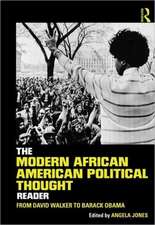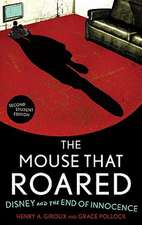African Americans and Jungian Psychology: Leaving the Shadows
Autor Fanny Brewsteren Limba Engleză Paperback – 21 feb 2017
Beginning with an examination of how Jungian psychology initially failed to engage African Americans, and continuing to the modern use of the Shadow in language and imagery, Brewster creates space for a much broader discussion regarding race and racism in America. Using Jung’s own words, Brewster establishes a timeline of Jungian perspectives on African Americans from the past to the present. She explores the European roots of analytical psychology and its racial biases, as well as the impact this has on contemporary society. The book also expands our understanding of the negative impact of racism in American psychology, beginning a dialogue and proposing how we might change our thinking and behaviors to create a twenty-first-century Jungian psychology that recognizes an American multicultural psyche and a positive African American culture.
African Americans and Jungian Psychology: Leaving the Shadows explores the positive contributions of African culture to Jung’s theories and will be essential reading for analytical psychologists, academics and students of Jungian and post-Jungian studies, African American studies, and American studies.
| Toate formatele și edițiile | Preț | Express |
|---|---|---|
| Paperback (1) | 459.49 lei 6-8 săpt. | |
| Taylor & Francis – 21 feb 2017 | 459.49 lei 6-8 săpt. | |
| Hardback (1) | 1215.90 lei 6-8 săpt. | |
| Taylor & Francis – 21 feb 2017 | 1215.90 lei 6-8 săpt. |
Preț: 459.49 lei
Nou
Puncte Express: 689
Preț estimativ în valută:
87.92€ • 92.06$ • 72.93£
87.92€ • 92.06$ • 72.93£
Carte tipărită la comandă
Livrare economică 10-24 aprilie
Preluare comenzi: 021 569.72.76
Specificații
ISBN-13: 9781138952768
ISBN-10: 1138952761
Pagini: 152
Dimensiuni: 156 x 234 x 18 mm
Greutate: 0.23 kg
Ediția:1
Editura: Taylor & Francis
Colecția Routledge
Locul publicării:Oxford, United Kingdom
ISBN-10: 1138952761
Pagini: 152
Dimensiuni: 156 x 234 x 18 mm
Greutate: 0.23 kg
Ediția:1
Editura: Taylor & Francis
Colecția Routledge
Locul publicării:Oxford, United Kingdom
Public țintă
Postgraduate and ProfessionalCuprins
Foreword by Polly Young-Eisendrath. Introduction. 1. Jung’s Early America: Racial Relations and Racism 2. The Reality of Racial Chains and the Myth of Freedom 3. American Racial Black and White Complexes 4 Africanist Traditions and African American Culture 5. African Archetypal Primordial: A map for Jungian psychology 6. Archetypal Grief of African American Women 7. The Jungian Shadow 8. The Dreamers of Saint Elizabeth Hospital 9. African American Cultural Consciousness and the Jungian Collective 10. The Promise of Diversity 11. Summary: Healing through an Africanist Perspective. Index.
Notă biografică
Fanny Brewster, Ph.D., is a Jungian analyst in private practice in New York and Professor of Psychology at Pacifica Graduate Institute. She is a member of the Association of Black Psychologists and the Philadelphia Association of Jungian Analysts, and has been twice nominated for the Gradiva Award for her nonfiction writing.
Recenzii
"African Americans and Jungian Psychology: Leaving the Shadows brilliantly captures the essence of American Jungian Psychology and its relationship to African Americans. Fanny Brewster has written a ground-breaking book essential to our understanding of Jungian Psychology, and its influence on how we perceive and interact with one another in American society based on racial preconceptions. As we witness the beginning of new political and social movements in our country, this book is uncannily timely in its historical view of African American culture, racial complexes, and the psychological divide due to racial tensions in America." - Laura Wexler, author of Fire in a Canebrake: The Last Mass Lynching in America
"In this rich exploration of the psychological legacy of slavery and modern day racism, Fanny Brewster manages to hold to the value of Jung’s ideas whilst also offering a serious critique of the racist roots of some of his concepts. In so doing she offers a crucial and potentially creative challenge to our Jungian community which largely persists in turning a blind eye to these matters and remains predominantly white. Whilst of considerable interest to anyone concerned with the psychology of racism, this book should be essential reading for all who consider themselves Jungians on both sides of the Atlantic." - Helen Morgan, Jungian analyst and Chair of the British Psychoanalytic Council
"Fanny Brewster in her compelling book on African Americans and Jungian Psychology, makes visible what she calls a racial complex that has operated from the beginning birth pangs of Analytical Psychology with Carl Jung’s own blindness to the current cultural context in his theory of archetypal psychology, to the silence of the Jungian community over the past nearly one hundred years to redress and address the blank spaces around race in the development of its theories and practices. The failure to include those forces that continues to generate the expressions of racial tensions and violence that appear daily in our newspaper and social media and the lives of many of our patients of color perpetuates another kind of invisibility.
Fanny’s narrative is a weaving of her fertile imagination in a way that opens Jung and analytical psychology’s relationship to race and its cultural context of the presence of some of the same societal tensions that can be found haunting our analytical thinking and practices. She challenges the reader to locate him or herself in this current narrative so as to have an encounter with the other." - Samuel Kimbles, Jungian Analyst, San Francisco, US and author of Phantom Narratives: The Unseen Contributions of Culture to Psyche
"African Americans and Jungian Psychology is a revelatory, bold, courageous, and fascinating book that provides an examination and a critique of Jungian Psychology. The book champions the inclusion of Africa’s contribution to the field of Jung Psychology, and for inclusion of people of color in treatment utilizing a Jungian psychological approach. African Americans and Jungian Psychology provides the reader with a powerful look into both historical, and contemporary views of Jungian Psychology and its relationship with African Americans. It is the first book of its kind providing insights never before explored." - Juwayriah J. Hassan, Certified Gestalt Psychotherapist, Staff Management Coach and Training Consultant
"This is an exceptional scholarly and penetrating analysis into the Eurocentric roots of Jungian psychoanalysis and the challenges that it faces in order to become more relevant in today’s ethnic and racial divisive world, especially as it pertains to African Americans. Dr. Brewster observes how all of the Jungian complexes have been amplified by later theoreticians, with the one exception of the racial complex; this focused avoidance is what impedes Jungian psychology from any significant contribution to the American racial dilemma. This theoretical negation preempts the required knowledge and therefore empathy required and so beautifully explained by Dr. Brewster: 'When the African American client arrives for psychoanalysis this is the sorrow of generations that arrives with them- there is no way to leave it outside the door.' While this book is specifically illustrative of the challenges for the Jungian school of thought, I believe that it has much for all psychoanalysts to digest regardless of their analytic persuasion. I recommend this book for analysts who understand that issues of race and racism impact the analytic dyad, regardless of their racial composition." - Kirkland C. Vaughans, Ph.D., author of Psychology of Black Boys and Adolescents
"In this rich exploration of the psychological legacy of slavery and modern day racism, Fanny Brewster manages to hold to the value of Jung’s ideas whilst also offering a serious critique of the racist roots of some of his concepts. In so doing she offers a crucial and potentially creative challenge to our Jungian community which largely persists in turning a blind eye to these matters and remains predominantly white. Whilst of considerable interest to anyone concerned with the psychology of racism, this book should be essential reading for all who consider themselves Jungians on both sides of the Atlantic." - Helen Morgan, Jungian analyst and Chair of the British Psychoanalytic Council
"Fanny Brewster in her compelling book on African Americans and Jungian Psychology, makes visible what she calls a racial complex that has operated from the beginning birth pangs of Analytical Psychology with Carl Jung’s own blindness to the current cultural context in his theory of archetypal psychology, to the silence of the Jungian community over the past nearly one hundred years to redress and address the blank spaces around race in the development of its theories and practices. The failure to include those forces that continues to generate the expressions of racial tensions and violence that appear daily in our newspaper and social media and the lives of many of our patients of color perpetuates another kind of invisibility.
Fanny’s narrative is a weaving of her fertile imagination in a way that opens Jung and analytical psychology’s relationship to race and its cultural context of the presence of some of the same societal tensions that can be found haunting our analytical thinking and practices. She challenges the reader to locate him or herself in this current narrative so as to have an encounter with the other." - Samuel Kimbles, Jungian Analyst, San Francisco, US and author of Phantom Narratives: The Unseen Contributions of Culture to Psyche
"African Americans and Jungian Psychology is a revelatory, bold, courageous, and fascinating book that provides an examination and a critique of Jungian Psychology. The book champions the inclusion of Africa’s contribution to the field of Jung Psychology, and for inclusion of people of color in treatment utilizing a Jungian psychological approach. African Americans and Jungian Psychology provides the reader with a powerful look into both historical, and contemporary views of Jungian Psychology and its relationship with African Americans. It is the first book of its kind providing insights never before explored." - Juwayriah J. Hassan, Certified Gestalt Psychotherapist, Staff Management Coach and Training Consultant
"This is an exceptional scholarly and penetrating analysis into the Eurocentric roots of Jungian psychoanalysis and the challenges that it faces in order to become more relevant in today’s ethnic and racial divisive world, especially as it pertains to African Americans. Dr. Brewster observes how all of the Jungian complexes have been amplified by later theoreticians, with the one exception of the racial complex; this focused avoidance is what impedes Jungian psychology from any significant contribution to the American racial dilemma. This theoretical negation preempts the required knowledge and therefore empathy required and so beautifully explained by Dr. Brewster: 'When the African American client arrives for psychoanalysis this is the sorrow of generations that arrives with them- there is no way to leave it outside the door.' While this book is specifically illustrative of the challenges for the Jungian school of thought, I believe that it has much for all psychoanalysts to digest regardless of their analytic persuasion. I recommend this book for analysts who understand that issues of race and racism impact the analytic dyad, regardless of their racial composition." - Kirkland C. Vaughans, Ph.D., author of Psychology of Black Boys and Adolescents
Descriere
African Americans and Jungian Psychology: Leaving the shadows explores the little known racial relationship between the African diaspora and C.G. Jung’s analytical psychology. In this unique book, Fanny Brewster explores the culture of Jungian psychology in America and its often difficult relationship with race and racism.




















